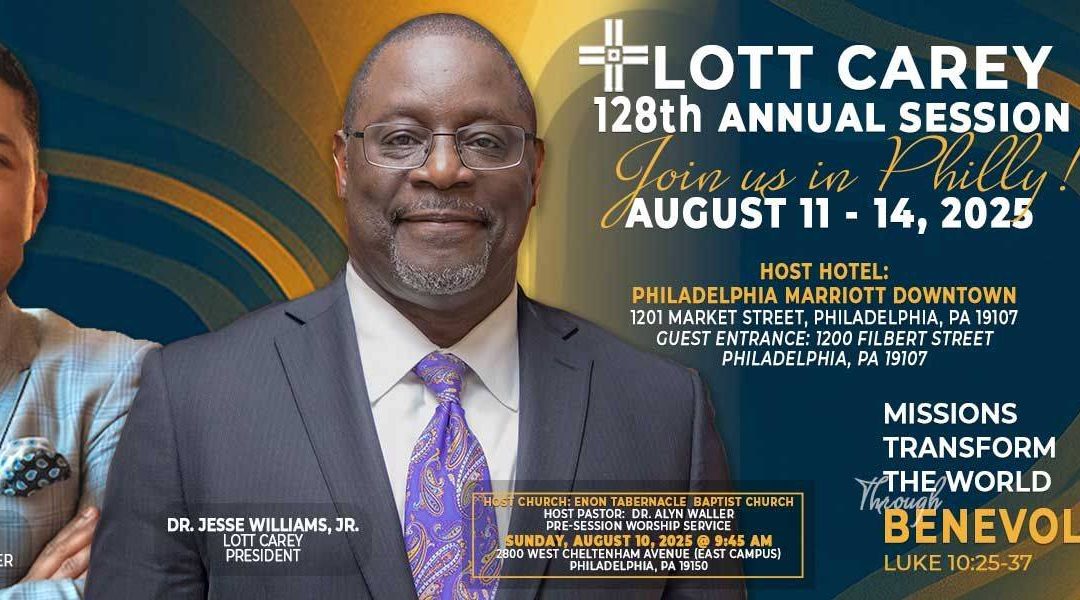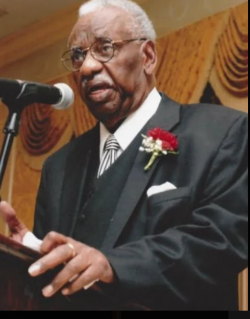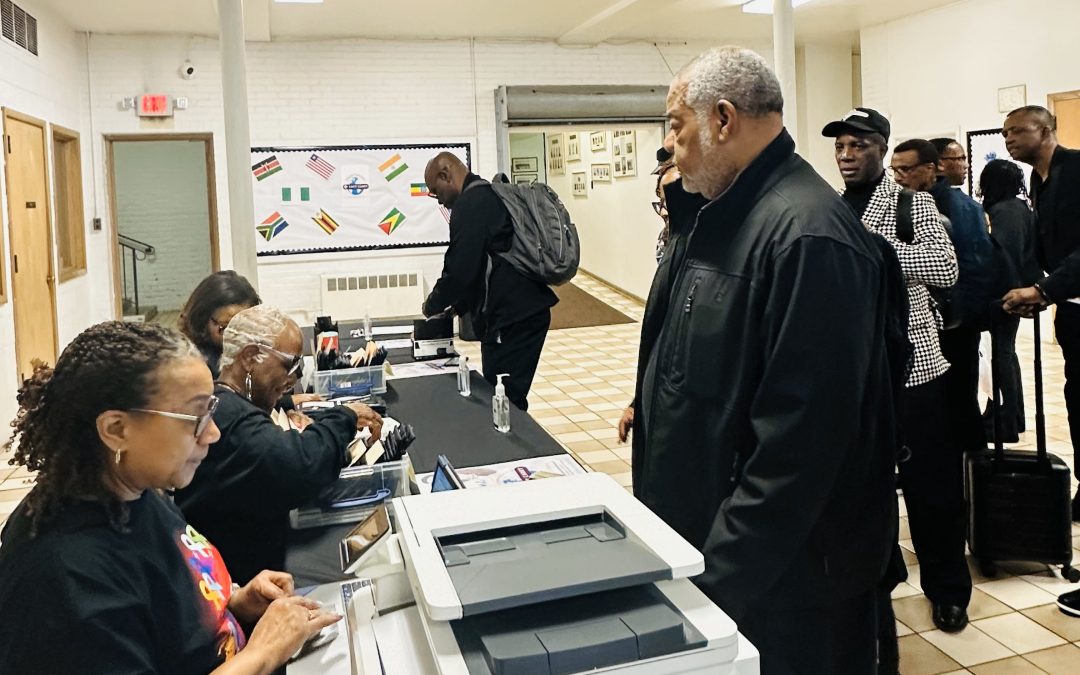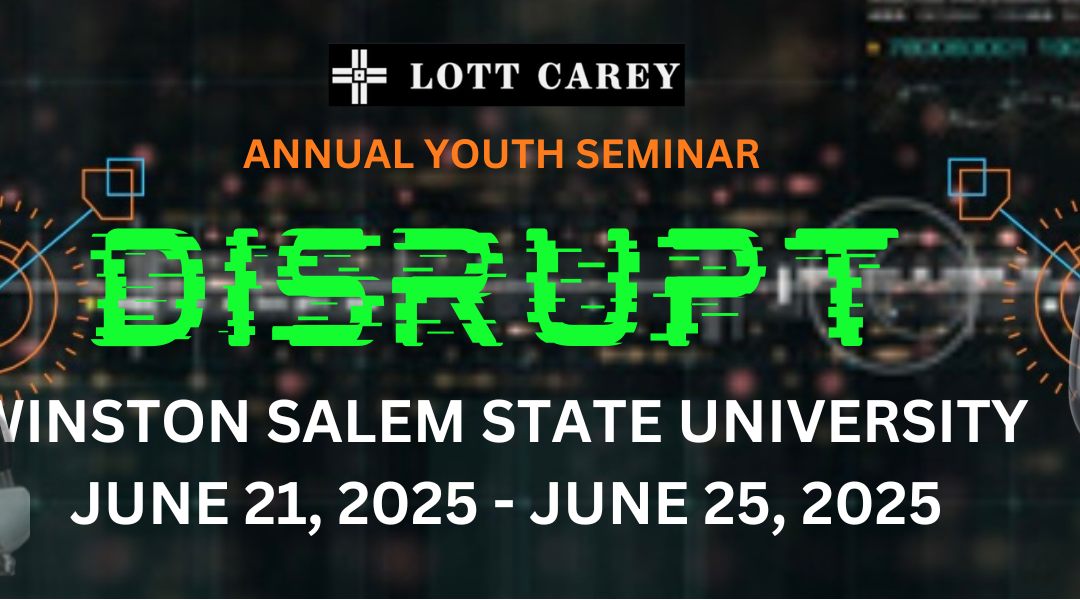
by Eron Henry | Jun 19, 2025 | News, News
Registration is now open for the 128th Lott Carey Annual Session, and we are excited to welcome you to Philadelphia, Pennsylvania, from August 11–14.
An extra day, August 15, is for those who wish to participate in the annual golf tournament.
This year’s gathering marks the beginning of another chapter in our shared mission journey, launching a three-year vision under the theme “Missions Transform the World through Benevolence,” drawn from Luke 10:25–37.
We invite you to join us in exploring the pillars of benevolence, empowerment, and advocacy—anchored in faith and driven by purpose.
This in-person experience will be filled with vibrant worship, transformative witness, and deep engagement. Attendees will participate in morning prayer gatherings, CommUNITY sessions with Women in Service Everywhere (WISE) and SpeakMen (Men on Missions), mission education studies, and hands-on service opportunities. Morning and evening worship will be led by dynamic preachers and gifted psalmists, creating sacred moments of inspiration and renewal. Children and youth will also have dedicated programming, ensuring that every generation is included in this meaningful experience.
Special events will include a Pre-Session Worship Service at Enon Tabernacle Baptist Church, a Worship Arts Concert, an Evening of Jazz, a Golf Tournament supporting international education, and the Missions’ Luncheon featuring voices from our global partners.
The Lott Carey team, alongside our local host partners in Philadelphia, has been working diligently to make this Annual Session a memorable and impactful experience.
We sincerely apologize for the inconvenience caused by the recent technical difficulties with the Lott Carey website. We are pleased to share that those issues have been fully resolved, and one can access the registration system through the Lott Carey website. We appreciate your patience and understanding during this time.
Now is the time to secure your spot and make your hotel reservations. Join us in Philadelphia for this historic moment in the life of the Lott Carey family. Your presence will help shape the future of our mission efforts and set the tone for this exciting new season.
We can’t wait to see you in Philadelphia. Click here to register.

by Eron Henry | May 21, 2025 | News, News
The Lott Carey global mission community is calling on its members and partners to respond with compassion and urgency to the devastating tornadoes that struck St. Louis on May 16. This disaster has left a trail of destruction across neighborhoods, claiming lives, displacing families, and damaging homes, churches, and community centers.
The EF3 tornado that tore through the city caused more than one billion dollars in damage. More than 100,000 residents lost power, and at least five lives were lost in the storm. Entire communities are now facing the long road to recovery, with many in urgent need of shelter, food, medical care, and emotional support. Tornados affected other areas taking the lives of many and causing widespread damage.
In the spirit of our mission to extend Christian witness through acts of service and solidarity, Lott Carey encourages its members to take action. We ask that you lift up the people of St. Louis in your prayers. Pray for comfort for those who are grieving, strength for those who are rebuilding, and wisdom for leaders guiding the recovery.
In addition to prayer, monetary donations are the most effective way to support relief efforts. We urge you to contribute to Lott Carey in its compassionate response.
We also encourage you to spread the word within your networks. Encourage others to support the recovery efforts and to stand in solidarity with our brothers and sisters in St. Louis.
Lott Carey stands with the people of St. Louis. Together, we can be a source of healing in this time of great need.

by Eron Henry | May 1, 2025 | News, News
The Lott Carey Baptist Foreign Mission Convention joins the broader faith community in mourning the passing of Rev. Dr. Gus Roman, former President of Lott Carey and a towering figure in the global Church. Dr. Roman transitioned from labor to reward on April 23, leaving behind a rich legacy of leadership, prophetic witness, and global impact.
Rev. Dr. Roman served Lott Carey with distinction, bringing visionary leadership and a passionate commitment to global missions, justice, and pastoral excellence. His contributions to the growth and reach of the Convention were both transformational and enduring. As President from 1997-2000, he helped amplify the voice and work of Lott Carey across Africa, the Caribbean, and other parts of the world.
In celebration of his life and legacy, Lott Carey will be officially represented at his Service of Triumph by:
- Rev. Emmett L. Dunn, Executive Secretary-Treasurer
- Rev. Gregory Jackson, Chairman, Board of Directors
- Rev. Dr. Clifford A. Jones, and Rev. Dr. J. Michael Sanders, former Lott Carey presidents
Alongside an array of other Lott Carey leaders and partners.
“We give thanks to God for the life and service of Dr. Roman,” said Executive Secretary-Treasurer, Rev. Dunn. “His voice called us to a higher standard, and his life modeled servant leadership rooted in justice, compassion, and conviction. He will be deeply missed but never forgotten.”
Service Arrangements:
Public Viewing
Thursday, May 8, 2025
11:00 AM – 7:00 PM
Zion Baptist Church
3600 N. Broad Street
Philadelphia, PA
Celebration of Life Service
Friday, May 9, 2025
Viewing: 9:00 AM – 10:00 AM
Service: Immediately following
Salem Baptist Church of Abington
2741 Woodland Road
Abington, PA
Livestream available via Salem’s website
Interment
Friday, May 9, 2025 – 2:00 PM
George Washington Memorial Park
80 Stenton Avenue
Plymouth Meeting, PA 19462

by Eron Henry | Apr 28, 2025 | News, News
Lott Carey is thrilled to announce its 128th Annual Session, scheduled to take place from August 11-14. This year, the event will be held at the Philadelphia Marriott Downtown Hotel in Pennsylvania. Host church is the Enon Tabernacle Baptist Church under the esteemed leadership of Rev. Dr. Alyn E. Waller, Senior Pastor.
The Lott Carey Annual Session is a significant gathering that unites mission-minded individuals, churches and organizations from various countries. It is a time dedicated to fellowship, worship, learning, and strategic planning to further the mission of spreading the gospel and serving communities worldwide.
Attendees can look forward to inspirational worship services led by dynamic speakers and musicians, educational workshops designed to equip participants with tools and knowledge for effective ministry and mission work, and numerous networking opportunities to connect with fellow attendees, mission partners, and leaders in various fields. Additionally, there will be special sessions and activities tailored for youth and children to inspire and educate the next generation of mission leaders.
To ensure a comfortable stay during the event, attendees are encouraged to make hotel reservations at the Philadelphia Marriott Downtown. This hotel provides excellent amenities for guests. Attendees can book their rooms directly through the hotel’s website or contact the hotel for assistance with reservations by calling 877-212-5752.
Attending the Lott Carey Annual Session is an opportunity to be part of a transformative experience that empowers individuals, churches and organizations to make a meaningful impact in their communities and beyond. Whether you are a seasoned mission worker or new to the field, this event offers valuable insights, inspiration, and connections that can enhance your ministry and mission efforts.
Don’t miss out on this incredible opportunity to join fellow believers in worship, learning, and mission planning. Make your hotel reservations today at the Philadelphia Marriott Downtown to ensure a comfortable and convenient stay during the event. For more information about the Lott Carey 128th Annual Session and to register for the event, please visit the official Lott Carey website at lottcarey.org.
We look forward to seeing you in Philadelphia for a week of inspiration, fellowship, and mission-focused activities!

by Eron Henry | Apr 18, 2025 | Blog, News
Beloved Lott Carey Family,
Grace and peace to you in the matchless name of our Risen Lord and Savior, Jesus Christ.
This Easter, as we gather across continents and cultures to celebrate the resurrection of Jesus, we are reminded that the tomb is empty, and hope is alive. The Resurrection is not merely an event in history, it is a divine declaration that death does not have the final word, that despair will not define our destiny, and that God’s love will always outlast the brokenness of this world.
In a time marked by global uncertainty, we hold fast to this Gospel hope. As America grapples with “America First” policies that have led to the mass deportation of countless persons, many of whom are our brothers and sisters in Christ, we grieve the suffering and displacement. We witness the deepening crisis in Haiti, the unrelenting war in Ukraine, and the growing consequences of climate change across the Global South. These are not abstract headlines to us; they are real burdens carried by members of the global church.
And yet, even in the shadow of the cross, we proclaim the light of the Resurrection. We are people of HOPE!
Through it all, the mission of Lott Carey endures, sustained by the unshakable provision of God. Where there is need, we see God’s hand making a way. Where there is fear, we see faith rising. Our partners around the world, missionaries, pastors, educators, healers, are living witnesses to the power of the Resurrection. Together, we embody the Gospel that declares: He is risen indeed!
Let us be reminded this Easter that Resurrection is not only a promise of eternal life but a call to courageous living now. It calls us to advocate for justice, extend compassion, and stand in solidarity with the marginalized. It calls us to pray, to serve, to give, and to never lose heart.
The same power that raised Jesus from the dead is at work within us. So we move forward with holy expectation, believing that even in the darkest night, the morning will come. We trust that God, who began a good work in us, will be faithful to complete it.
May your hearts be lifted this Easter with renewed purpose, fresh joy, and unwavering hope.
Christ is risen! He is risen indeed!
In the hope of the Resurrection,
Emmett L. Dunn
Executive Secretary-Treasurer/CEO

by Eron Henry | Apr 6, 2025 | News
Lott Carey is excited to announce that registration is now open for its 2025 Annual Youth Seminar. The five-day transformative event will be held June 21-25, on the campus of Winston-Salem State University in North Carolina.
This year’s theme, “DISRUPT,” is inspired by Acts 17:6, “These men who have caused trouble all over the world have now come here.” The theme challenges participants to transform the status quo of Christianity, creating a stronger, more inclusive faith that invites all people to see themselves as part of God’s plan for humanity.
“The ultimate goal of this year’s seminar is to DISRUPT ways of living and thinking that prevent people from seeing the true kingdom of God just as Christ DISRUPTED systems and traditions that hindered people from accessing a better life,” says Rev. Brittany D. Mingo, International Youth Department Team Leader for Lott Carey.
The seminar will feature daily plenary sessions, Family Group gatherings, mission outreach opportunities in the local community, worship sessions, and evening devotions. Participants will also have the chance to engage in extracurricular activities such as choir, dance, mime, and recreation. The comprehensive five-day experience combines spiritual growth with practical mission work designed to equip young people to return to their communities as agents of positive change.
Registration fee is $495 per person, which includes all meals from Saturday dinner through Thursday breakfast, with accommodations in the university residence halls. Online registration closes May 31 or when full capacity is reached, whichever comes first.
Adult participants aged 18 and older must complete the mandatory Clery Act training provided by Winston-Salem State University. Additionally, adult chaperones are required to submit a letter from their pastor acknowledging their capacity to serve and must have completed a background check within the last five years.
With limited capacity, early registration is encouraged. As Rev. Brittany notes in her welcome letter, “Whether the decision was yours, or someone ‘voluntold’ you to come, I promise this will be an unforgettable, life-changing experience.”
For more information about the 2025 Lott Carey Annual Youth Seminar, please contact events@lottcarey.org, visit www.lottcarey.org, or call (301) 429-3300.
Click here for Lott Carey Youth Seminar Registration







Recent Comments